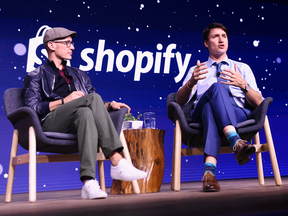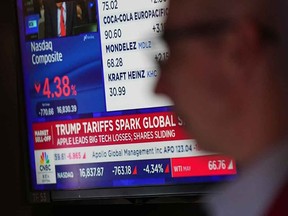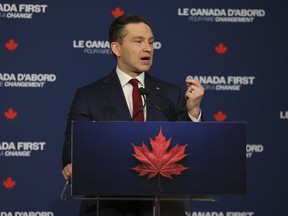General election unlikely before May if Parliament prorogued until March 24

Article content
U.S. president-elect Donald Trump’s escalating threats about tariffs and his rhetoric about annexing Canada have prompted some Canadian business leaders to call for an immediate election campaign.
Article content
Article content
“Canada will have to make difficult choices and it would be best made by a leader with a clear and fresh mandate,” said Jon Love, founder of KingSett Capital Inc., a Toronto-based real estate company. Asked if he believes Trump’s comments are serious enough to warrant an emergency election, Love responded yes.
Advertisement 2
Article content
The country’s parliament is suspended until March 24 following Prime Minister Justin Trudeau’s announcement Monday that he’ll leave once his successor is chosen in a Liberal Party leadership vote. If the government sticks to that date, a general election isn’t likely to happen before May.
By that point, the Canadian economy may be nearing a recession if the country is engulfed in a tariff war with the United States. Trump has threatened to put 25 per cent tariffs on the goods the U.S. buys from Canada and Mexico immediately after taking office.
Since the U.S. election, economic uncertainty in Canada has jumped to levels not seen since the COVID pandemic, according to an index compiled by researchers at Northwestern University, Stanford University and the University of Chicago. Uncertainty in 2020 was itself the highest since the index’s inception in 1985.
Tobi Lutke, chief executive of Shopify Inc., said in a social media post that it “isn’t OK” to “have millions of Canadians watch from the sidelines for months while the party figures itself out.”
The prime minister is on his way out, but federal departments remain operational and the government still has the power to act on many items even if parliament is not sitting. For example, if Trump follows through with tariffs, Canada can impose retaliatory duties on American goods without passing legislation, as it did in 2018 during the battle over steel and aluminum tariffs.
Article content
Advertisement 3
Article content
Further, Canada’s plan to boost patrols and security at its border “contains a series of measures which do not require parliamentary approval,” a spokesperson for Public Safety Minister David McGuinty said in a statement.
Polls show the Conservative Party, led by Pierre Poilievre, would be in position to win a majority government if an election were held right now.
‘Leadership vacuum’
“We cannot afford to have a leadership vacuum over the next several months. We need an election ASAP,” Perrin Beatty, a former federal cabinet minister who led the Canadian Chamber of Commerce until last year, said in a post on LinkedIn.
He’s not alone. John Ruffolo, founder of Toronto-based Maverix Private Equity, said there’s “absolutely” a need for a vote to give a new government the authority to negotiate with the Trump administration.
But business leaders must accept the limits of the political system, said Daniel Tisch, president and chief executive of the Ontario Chamber of Commerce.
“We have to focus our energy where it’s most needed,” he said in an interview. “The reality is there’s zero prospect of a federal election in Canada when the governing party is in the midst of a leadership race.”
Advertisement 4
Article content
Instead, he suggested that businesses “try to ensure that we have leaders in all parties, but particularly the two largest parties, that are promoting a sustainable growth agenda.”
If an election were called today, the rules state that voters wouldn’t cast ballots until at least 36 days from now — so mid-February at the earliest, according to Yaroslav Baran, a former senior Conservative government staffer and co-founder of the Pendulum Group. It probably won’t make much difference to wait until early May, he said.
“If Trump imposes a tariff in the middle of an election campaign versus immediately before an election campaign, the government response is still going to be the same,” he said. In either case, even with a caretaker government during an election, cabinet ministers and deputy ministers would convene with “all hands on deck.”
But this will be a challenging period for the government, Baran added. It’s unclear whether key ministers handling U.S. relations — including Foreign Affairs Minister Melanie Joly and Industry Minister Francois-Philippe Champagne — will follow the lead of Finance Minister Dominic LeBlanc and opt out of the Liberal leadership race to focus on dealing with policy.
Advertisement 5
Article content
“That’s going to be a pretty central question. Canada’s already going into this with a disadvantage of a lame-duck government on its way out the door, but swapping in a bunch of rookies to take over this hot file right now would be even more destabilizing,” Baran said.
Ontario Premier Doug Ford, who has appeared multiple times on Fox News to speak about the importance of Canada-U.S. trade, said at a news conference on Wednesday that provincial leaders will continue to push Trudeau.
“We’re going to hold his feet to the fire until the day he’s no longer prime minister,” Ford said.
Recommended from Editorial
Tisch called Trump’s annexation threats “disappointing, disrespectful and distracting,” but said he believes cooler heads will prevail after the Jan. 20 inauguration. “Mr. Trump inherits the strongest economy in the world, and job one is not to screw that up.”
—With assistance from Christine Dobby and Randy Thanthong-Knight.
Bloomberg.com
Article content
Canadian CEOs push for early election as Trump escalates threats
2025-01-08 20:26:15




